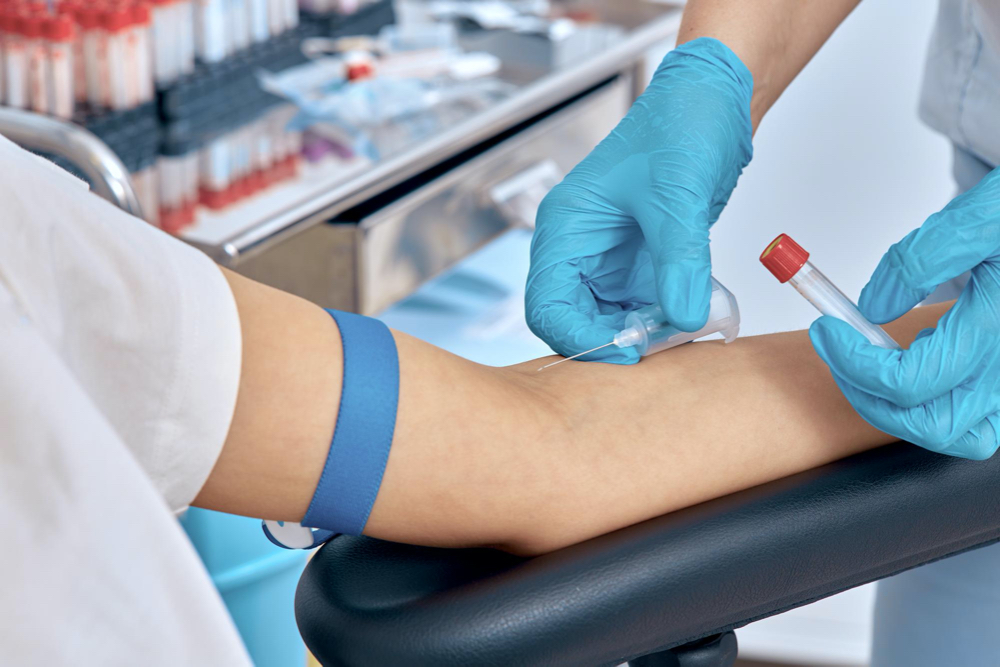- Fast results
- 4,000+ locations
- 4.8 star rating
Need Help? (888) GET LABS


A high chloride level may indicate kidney disease, adrenal insufficiency, digestive problems, and other metabolic disorders. That said, it’s imperative to lower it back to the normal chloride levels by consulting your doctor and getting further tested for the underlying disease, avoiding certain foods and medications, and ensuring enough water retention. Read on to find out how to follow these steps and why treating high chloride levels is important.
Chloride is an electrolyte that regulates fluid balance in the body and the movement of substances in the cells. It works along with other electrolytes like sodium and potassium.
High chloride levels (hyperchloremia) indicate dehydration, while low concentrations (hypochloremia) can be linked to various health conditions like Addison’s disease, lung problems, certain medications, and heart failure. Diagnosing chloride imbalance can be done through a chloride blood test.
The following are ways to lower high chloride levels:
When chloride levels are moderately high, symptoms are often unnoticeable. However, consistent hyperchloremia can be associated with several medical problems. These include the following:
Pro tip: Hyperchloremia does not show evident symptoms unless the condition is persistent. Hence, most people are able to detect high chloride levels when taking an electrolyte blood panel, which also screens for sodium and potassium levels in the blood.
Water is a basic need for a reason. Cells rely on fluid to transport nutrients and other substances to come in and out. Hence, if you’re frequently dehydrated or don’t maintain the recommended daily water intake, its ratio with electrolytes will surely go out of scale.
To make sure you’re always hydrated, keep track of how much water you’re drinking in a day. Although eight glasses of water are the general threshold, your needs may be different. The best way to know your ideal water intake is to ask your healthcare provider.
Read more: The Health Benefits of Water
Several foods and drinks can actually make you thirsty. Naturally, this leads to dehydration, causing high chloride levels.
If you have hyperchloremia, make sure to avoid foods like deli meats, meals with tons of soy sauce, desserts with highly refined sugars, and processed food products. Also, consider reducing your consumption of coffee and alcohol. Drinking alcoholic beverages, in particular, makes you urinate more since these drinks are generally considered as diuretics.
When consulting your doctor, list down all the medications you’re taking. In some cases, the rise in chloride levels can be linked to certain drugs that cause electrolyte imbalance. These include medications like:
Did You Know? Chemotherapy can also induce hyperchloremia. During this procedure, patients may experience nausea and vomiting, which causes dehydration. Thus, it’s important to ask your doctor about fluid retention management if you’re undergoing chemotherapy.
Heat exposure, especially during summer, can impact hydration. If you have high chloride levels, keep yourself safe from too much heat by staying indoors. Postpone any outdoor trips until you have your chloride levels back to normal. Most importantly, drink water based on recommended water intake.
Electrolyte abnormalities are often linked to eating disorders like anorexia and bulimia. This is because the adverse changes and effects of these conditions on digestive functions directly impact water absorption in your intestines.
Unlike other physical health conditions, eating disorders are rooted in behavioral factors. Hence, it may not be easy to realize you have one. This is why it’s critical to rely upon the support from people close to you and seek the opinion of a healthcare professional.
Too much exercise can reduce your water retention rate, resulting in electrolyte imbalances. If you’re new to a workout routine, start with low intensity until you can gradually increase. In fact, consider doing light activities at home so your body can adjust accordingly.
Pro tip: If you’re aiming to lose weight, you’re probably also thinking of altering your diet. However, this step, along with exercise, needs extra caution so as to not completely disrupt your normal body functions. Check out our article about five you need to know before choosing a weight loss plan.
One of the most common symptoms of high chloride levels is excessive thirst. The body compensates for the imbalance by signaling the need for more fluids. Frequent urination is another sign, as the kidneys try to flush out the excess chloride from the body.
Other symptoms may include muscle weakness, fatigue, and irregular heartbeat. In severe cases, individuals may experience seizures or confusion. It is important to pay attention to these signs and seek medical attention if any of these symptoms persist.

An excessive chloride level in the body can adversely affect health and well-being. As mentioned earlier, dehydration is one of the immediate dangers associated with elevated chloride levels. If you are dehydrated, you may experience fatigue, dizziness, or a diminished level of cognitive function.
The imbalances caused by high chloride levels may also interfere with the normal functioning of various body systems. Acid-base imbalances, for example, can affect the respiratory and cardiovascular systems, leading to shortness of breath, irregular heartbeat, and increased risk of cardiovascular diseases.
Moreover, high chloride levels may negatively affect kidney function. When chloride levels are elevated, they strain a kidney’s ability to maintain electrolyte balance, potentially causing kidney damage or dysfunction.
It is important to recognize the impact of high chloride levels on overall health and take the necessary steps to address the issue. By treating high chloride levels, individuals can improve hydration, restore electrolyte balance, and prevent the risk of further complications.
In addition to dehydration, high chloride levels can also result in metabolic alkalosis and acid-base imbalances.
Metabolic alkalosis occurs when there is an excess of base or a deficiency of acid in the body, leading to increased pH levels. This can result in muscle twitching, nausea, and confusion.
On the other hand, acid-base imbalances occur when there is an excess or deficiency of acid in the body, leading to an imbalance in pH levels. This can result in symptoms such as fatigue, weakness, and shortness of breath. If left untreated, these imbalances can seriously affect overall health and even be life-threatening.
Given that the normal chloride levels fall between 96 and 106 mEq/L, values extremely below or above this range should be a concern. For example, getting a chloride blood test result that shows 110 mEq/L suggests hyperchloremia. If this condition persists and treatment is absent, you can increase your risk of kidney failure.
Both hypochloremia (low chloride) and hyperchloremia (high chloride) may indicate serious health conditions. Hence, they both require the same amount of attention. When diagnosed with either, your primary goal should be correcting the electrolyte imbalance by addressing its underlying cause.
Treating high chloride levels involves seeing your doctor to diagnose the underlying cause. Since dehydration is typically the main culprit for elevated chloride levels in the blood, increasing your fluid intake is the most obvious remedy. However, there could be other factors contributing to this electrolyte imbalance. Without addressing these issues, hypochloremia will persist.
Treating high chloride levels is paramount for maintaining overall health and well-being. High chloride levels can lead to various health issues, including dehydration, metabolic alkalosis, and acid-base imbalances. By understanding the role of chloride in the body and recognizing the dangers of elevated chloride levels, individuals can take proactive steps to address this issue.


We now offer pharmacy discounts through our PersonalabsRx platform.
We now offer pharmacy discounts through our PersonalabsRx platform.